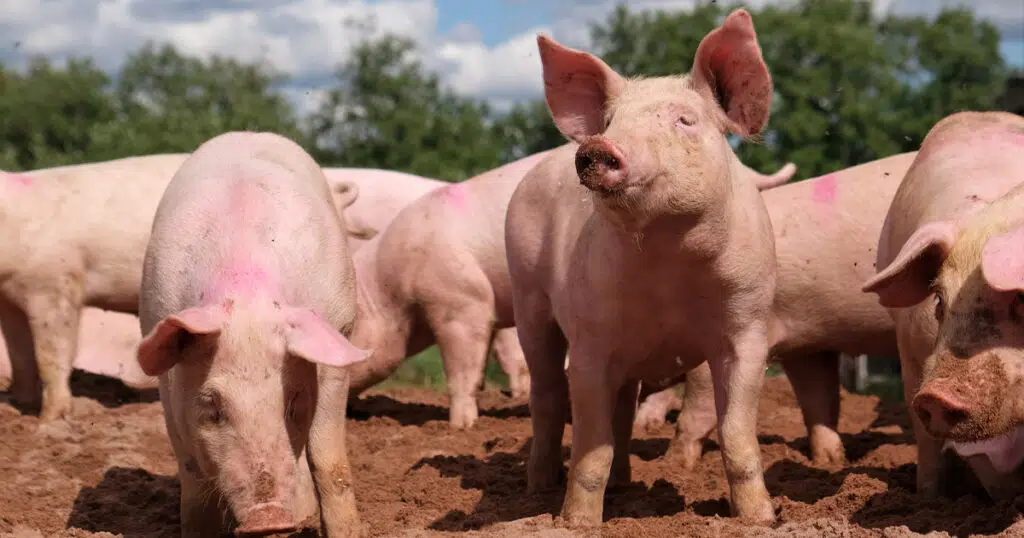
Supreme Court Pork Production Case Could Impact Abortion, Gun Rights
Although primarily focused on raising pigs, the California case that had oral arguments before the United States Supreme Court earlier this week could result in a decision that affects other cases, such as as those striking down federal abortion protections and expanding gun rights.
At issue is Proposition 12, a ballot measure approved by California voters in 2018 that requires bigger cages for certain farm animals, including breeding pigs, veal calves and egg-laying hens.
Pork producers filed a lawsuit, arguing that since 99 percent of the pork consumed in the Golden State comes from outside its borders, California was essentially imposing its laws on other states in violation of the U.S. Constitution.
The Biden administration sided with the pork producers, while both conservative and liberal Supreme Court justices seemed skeptical earlier this week of California’s law. Those same justices nonetheless had concerns about what striking down the law might mean. A ruling is expected sometime next summer.
California voters enacted Proposition 12 in 2018 in an effort to prevent animal cruelty. The law, yet to be enacted, bans the sale of bacon, chops and other pork products in the Golden State unless the sow from which a pig was born was housed in at least 24 square feet of floorspace — a standard that industry officials note few farms can meet.
Californian accounts for 13-percent of the nation’s consumption of pork, but is home to only a few pig farms, which means the costs of complying with Proposition 12 would mostly fall on out-of-state farmers, many of whom are based in the Midwest. U.S. Sen. Chuck Grassley, an Iowa Republicn, when aknowledging California’s law also calls for more space for egg-laying hens, denounced the law as a “war on breakfast.”
All that said, the lead plaintiff in the case is the Urbandale, Iowa-based National Pork Producers Association, the nation’s top producer of both pork and eggs.
The case considers a legal doctrine known as the dormant commerce clause, which generally bars states from passing laws that burden interstate commerce. If Congress has not passed a law affecting interstate commerce, like it hasn’t in the prok prodice case, the assumption under the doctrine is that Congress intends to keep an open market without state-imposed regulations.
Associate Justice Samuel Alito suggested that only a large state such as California could have such an impact on Constitutional law, because of the size of its population, nearly 40 million residents. Justice Samuel he asked if California was behaving like a bully.
In fact, several of the justices asked probing questions of both sides during the hours-plus of arguments that included more than two dozen references to Iowa. Their questions seemed to cross traditional conservative and liberal points of view, though there also appeared to be agreement among a majority of the court justices that the case could go back to a lower court for further review.
California holds the law is a restriction on sales within its borders that applies evenly, whether the pork originates from within its borders or outside.
Associate Justice Neil Gorsuch questioned whether federal courts should be involved in trying to balance a state’s interest against the effect on out-of-state industries.
“We’re going to have to balance your veterinary experts against California’s veterinary experts, the economic interests of Iowa farmers against California’s moral concerns and their views about complicity in animal cruelty,” Gorsuch told Timothy Bishop, the attorney for the pork producers council and the American Farm Bureau Federation, which is also a plaintiff in the case. “Is that any job for a court of law?”
The basis of the controversy is the widespread use by pork producers of tight gestation crates for pregnant sows, which proponents of the law say prevent the animals from turning around, are inhumane and encourage crowding that can lead to disease transmission.
Farmers respond that the pens are intended to prevent the mothers from unintentionally crushing their piglets and the cost of replacing them with larger enclosures would drive up the cost of pork across the entire country
Missouri pig producer Scott Hayes, said at a press conference held by the National Pork Producers Council that sows can indeed act aggressivly, so keeping them in individual pens, “where they can be fed and watered and cared for individually is a very humane way of housing” them.
“It’s what works best on our farm…and I think across the industry,” Hayes said. Other producers make “other systems work well. But it’s really up to the producer. We’re the experts. That’s what we do every day. We get up and take care of our animals.”
At a time when policies embraced by conservative states are often markedly different from those adopted by liberal ones, the ramifications of the dispute go far deeper than just the price of bacon or a slab of pork loin; the issie is when and how much such laws like that in California may reach beyond an individual state’s boundaries.
That question had led to other hypotheticals posed by the justices, such as, what would happen, for instance, if Texas banned the sale of fruit unless a producing state could demonstrate that it was harvested by U.S. citizens? Or, could a liberal state ban the sale of products from a conservative state that had adopted anti-LGBTQ policies?
Bishop challenged the suggestion that the primary motive of the opponents to the California law was the cost to themselves. He asserted that the farmers’ economic concerns have a moral aspect, thereby questioning whether California’s view of the morality of animal treatment should be allowed to outweigh Iowa’s.
“If California can tell folks in Iowa how to raise their sows, then Iowa can take the moral position that the most important moral thing to do here is to feed people at a reasonable cost by raising sows using pens,” Bishop told Associate Justice Elena Kagan. “You should decide this case on the basis that Iowa’s views on how pork should be raised, whatever those are, are just as weighty as California’s.”
Associate Justice Ketanji Brown Jackson wondered if there’s not a middle ground solution to the disagreement.
“Why can’t California solve for its morality issue in a different way?” she asked. “If we assume that it’s really going to create a burden to allow California to ban all Iowa pork on the grounds that California disagrees with how Iowa produces pork, why shouldn’t the balance to the extent we’re making one be to simply allow California to express its morality interest through a less burdensome means, like segregating Iowa’s pork when it comes in, putting a big label over it that says this is immorally produced or whatever, and that won’t hurt Iowa as much?”
But specifics of the doctrine remain unclear and some legal experts believe, for instance, that the case could have implications on whether lawmakers in one state may prohibit people from traveling to another state to obtain an abortion.
The U.S. Court of Appeals for the 9th Circuit dismissed the pork farmers’ lawsuit last year, writing that while the dormant commerce clause “is not yet a dead letter, it is moving in that direction.”
If the Supreme Court rules against pork producers in the case, Lori Stevermer, a Minnesota pig feeder and vice president of the National Pork Producers Council, lamented losing the California market could push farming operations like that of her her family’s out of business.
“The people we raise pigs for may say, ‘We don’t need your farm anymore.’”
The decision , she added, could be “life-changing for us.”



